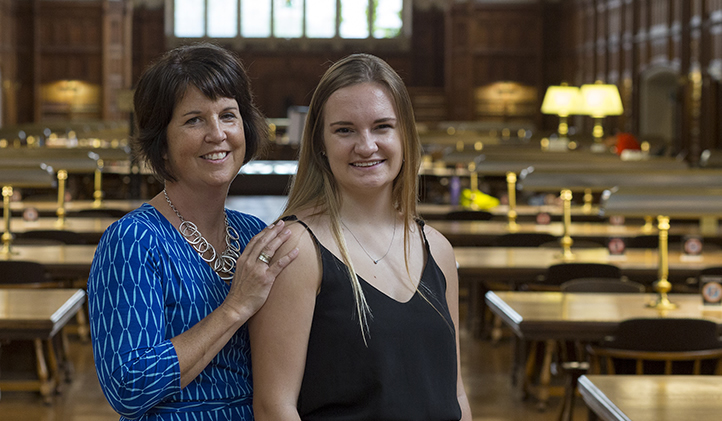Living Well With Metastatic Breast Cancer
Research advances and a personalized approach helped one Michigan woman flip the script on stage 4 breast cancer.

When Heather Jose was diagnosed with stage 4 breast cancer, she set a goal: Live to see her 14-month-old daughter go to kindergarten.
That day came and went long ago; in fact, she recently saw daughter Sydney off to her sophomore year of college.
A cancer survivor for nearly 19 years, Jose wants people to know that living with advanced cancer is possible, and more women will have the chance as treatment options expand.
Jose was only 26 when she received her diagnosis in 1998 in the Grand Rapids, Michigan, area. Her breast cancer had spread into her bones. A surgeon was grim about stage 4 treatment success statistics: He told her to get her affairs in order.
She made an appointment at the University of Michigan Rogel Cancer Center for another opinion.
“Dr. Merajver called me the next afternoon. The conversation was completely different,” Jose says. “She talked to me for a very long time about my life, my husband and my daughter. At the end, she told me to drink green tea and eat vegetables, and we’d start killing cancer on Monday.”
Treatment starts with hope
Sofia Merajver, M.D., Ph.D., medical oncologist and scientific director of the Rogel Cancer Center’s breast oncology program, approaches each patient’s cancer individually and does not think predictions make sense until treatment begins.
Jose’s treatment plan included four rounds of chemotherapy, which reduced her 5-centimeter tumor to undetectable.
“I wanted to immediately convey to Heather that we’d have a long road together, including the medical center helping her family get through this challenge. That’s why I wanted to know about her husband and family members,” says Merajver. “In addition to giving her confidence that we’ve seen her disease before, a first step is to begin to recruit the social support the patient needs.”
Because Jose’s cancer had spread, she knew not to expect to be cured. She had a double mastectomy, received radiation therapy and joined a clinical trial to receive two stem cell transplants. There have been several recurrences over the years, but each has been managed as treatment progresses for metastatic breast cancer.
“The goal for me is to hear that my scans are stable. Stable means good,” Jose says.
Cancer research advances
Merajver says Jose’s cancer has two genes that can now be directly targeted with drugs that weren’t available when she was first diagnosed. These advancements in care use an approach called precision medicine, customizing a person’s treatment plan based on the genetic sequencing and DNA analysis of cancer tumors.
An example is the cancer drug Herceptin, being used to target the HER2 gene. Jose has used this drug in the past and, though she does not take it now, it may be an option in the future.
“Another thing to consider besides responding well to treatment is how well Heather lives with metastasis every day. She has a fantastic way to organize her thoughts in a way to remain optimistic,” Merajver says. “Part of her treatment has been her mental strength to not let negative thoughts dominate her life.”
A hopeful future
Jose’s daughter, Sydney, grew from a toddler to a teenager to a young woman. In 2002, Jose and her husband, Larry, adopted a son, Ty, who is now 16. She returned to work as an occupational therapist in the school system.
Although she is scanned for changes in her cancer every six months and has managed side effects along the way, Jose says her life is not all about cancer. Aside from her diagnosis, she says her overall health has been quite normal and good.
“As I get older, I want more things. I’d love to be there for grandkids. I want to be able to travel with my husband. Those kinds of things, with cancer, you learn are not a given. There is a great lesson in terms of how you live day to day.”
Jose’s desire to help students led her to pitch an idea for a business to the Central Michigan University Research Corporation that helps bring innovative ideas to market. Her company, Theramazing, is developing a weighted hat for kids in school with sensory issues.
“It’s tied to my cancer experience, because I never want to wait or wonder if I should have done something. I have so much passion about being able to build this business. I am really enjoying the process of helping on a grander scale than (with) just one kid in therapy.”
Continue reading about breast cancer research, managing side effects and other stories of breast cancer survivorship
Metastatic Breast Cancer: What you should know
Comprehensive sequencing program shows promise of precision medicine for advanced cancer
Precision medicine test helps guide breast cancer patients’ chemotherapy decision
If you -- or someone you love -- has breast cancer that has spread to the brain, please see also our Metastatic Breast Cancer Coordinated Treatment (IMPACT) web pages.
